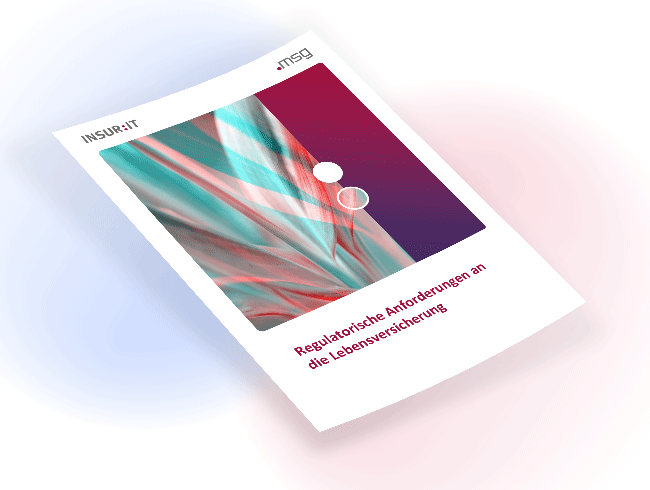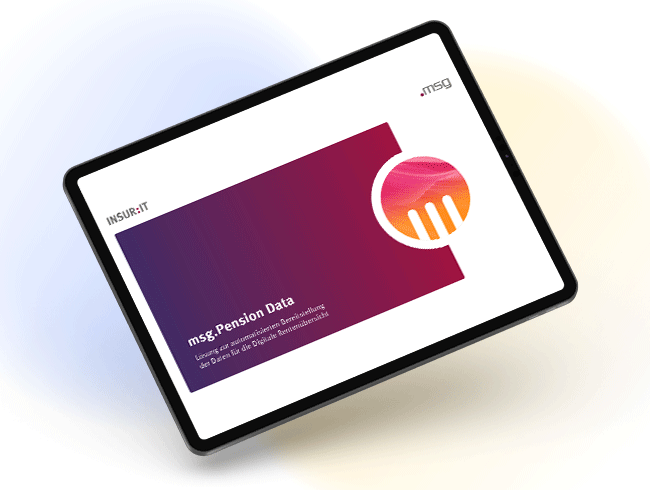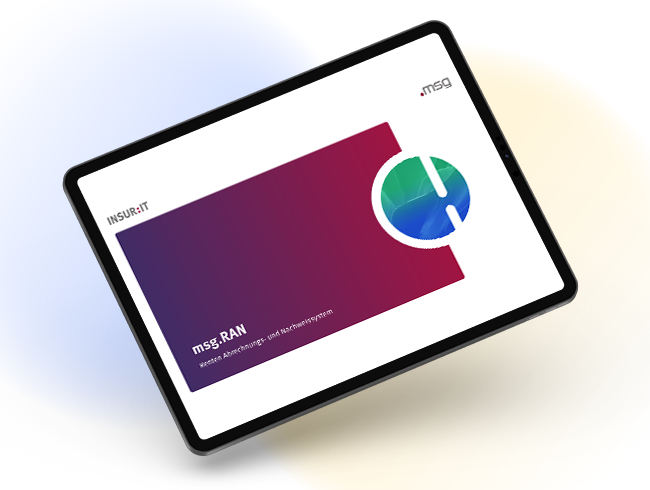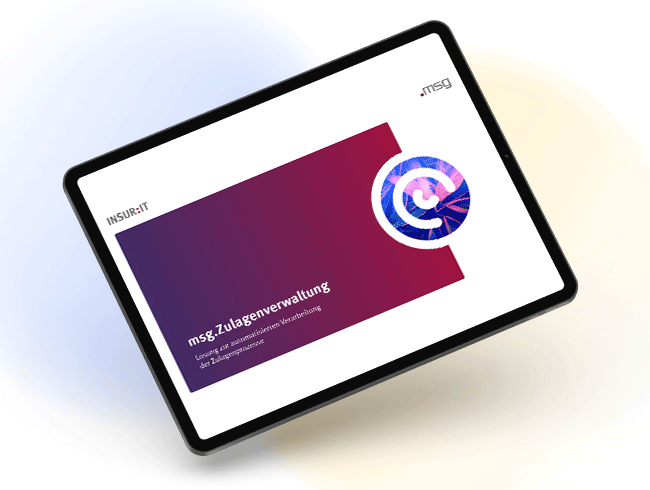Die Versicherungswirtschaft wird auf europäischer und auch auf nationaler Ebene laufend zur Umsetzung umfangreicher regulatorischer Anforderungen gezwungen. Ob EU-Transparenzverordnung, EU-Datenschutzgrundverordnung, Digitale Rentenübersicht, Solvency II Review oder VAIT: Die Umsetzung regulatorischer Vorgaben ist für viele Unternehmen ein Kraftakt, der enorme Ressourcen bindet. Bereits 2020 monierte der frühere GDV-Chefvolkswirt Klaus Wiener, dass die hohe Regulierungsdichte Deutschland Milliarden koste. Das gelte auch für die Versicherungsbranche, etwa bei den Melde- und Dokumentationspflichten. Kurzum: „Die Unternehmen wollen weniger Bürokratie, damit sie sich mehr auf ihr Kerngeschäft konzentrieren können.“
Mit moderner Standardsoftware den Regulierungsmarathon bewältigen
Termingerecht, vollständig und kostengünstig

Executive summary
Die Versicherungswirtschaft muss eine Fülle regulatorischer Vorgaben bewältigen, was die Branche vor große Herausforderungen stellt. Doch es gibt effiziente Wege, die komplexen Regelwerke zu erfüllen.

Trotz aller Appelle lässt der Regulierungsmarathon der Branche kaum eine Verschnaufpause. Die Zeit für die Umsetzung weiterer neuer Vorgaben läuft bereits.
– Digitale Rentenübersicht
Der Gesetzgeber hat im Jahr 2021 die Einführung einer Digitalen Rentenübersicht beschlossen. Mit dem Gesetz werden alle Anbieter privater und betrieblicher Altersvorsorge, die während der Anwartschaft regelmäßig Standmitteilungen an ihre Kunden verschicken müssen, verpflichtet, sich an das Portal bei der ZfDR (Zentrale Stelle für die Digitale Rentenübersicht) anzubinden. Für die technische Ausgestaltung und Anbindung der Vorsorgeeinrichtungen ist eine mehrmonatige Entwicklungsphase vorgesehen. Anschließend sollen in einer ersten Betriebsphase freiwillige Teilnehmer Echtdaten ihrer Kunden auf dem Portal zur Verfügung stellen. Voraussichtlich ab 2024 soll die Plattform in den verpflichtenden Regelbetrieb übergehen.
– EU-Transparenzverordnung
Im März 2021 trat die von der EU-Kommission beschlossene Transparenzverordnung (Sustainable Finance Disclosure Regulation SFDR) für Finanzdienstleister in Kraft. Die Verordnung regelt die Offenlegungspflichten von Produktgebern und Finanzberatern bezüglich Nachhaltigkeit in Strategien, Prozessen und Produkten. Die regulatorischen Anforderungen gelten für Versicherungsvermittler, da sie laut Verordnung zu den Finanzberatern gehören, sowie für Lebensversicherer und bAV-Anbieter, da sie sogenannte Versicherungsanlageprodukte anbieten. Die technischen Regulierungsstandards (RTS), die die Verordnung präzisieren, sind seit dem 1. Januar 2023 anzuwenden.
– IFRS 17
Schon seit einigen Jahren müssen sich Versicherer mit den neuen Bilanzierungsregeln nach IFRS 17 (International Financial Reporting Standard) beschäftigten. Jetzt ist es soweit: Das komplexe Regelwerk trat am 1. Januar 2023 in Kraft. Der neue Rechnungslegungsstandard regelt die Grundsätze in Bezug auf die Identifikation, den Ansatz, die Bewertung, den Ausweis sowie die Anhangangaben für Versicherungsverträge. Unternehmen, die nach IFRS bilanzieren müssen oder wollen und Quartalsbilanzen erstellen, benötigten bereits zum 1. Januar 2022 eine Eröffnungsbilanz.
– Solvency-II-Review
Das EU-Aufsichtsregime Solvency II, das bereits 2016 in Kraft trat, wird derzeit in einem mehrstufigen Prozess überprüft. Im Februar 2019 hatte die EU-Kommission die EU-Aufsichtsbehörde für das Versicherungswesen und betriebliche Altersvorsorge (EIOPA) beauftragt, technische Empfehlungen für die Überprüfung von Solvency II vorzulegen. Nach Vorlage der Stellungnahme durch die EIOPA präsentierte die EU-Kommission im September 2021 ihre eigenen Vorschläge. Der EU-Rat hat am 17. Juni 2022 seinen Standpunkt dazu veröffentlicht. Nun laufen die Trilog-Verhandlungen zwischen EU-Kommission, -Rat und -Parlament, deren Dauer offen ist.
– Novelle der Versicherungsaufsichtlichen Anforderungen an die IT (VAIT)
Mit Rundschreiben der BaFin vom 3. März 2022 sind die neuen VAIT in Kraft getreten, die Versicherungsunternehmen und Pensionsfonds ohne Übergangsfrist anwenden müssen. Das Schreiben legt die Vorschriften über die Geschäftsorganisation im VAG verbindlich aus und gibt einen flexiblen und praxisnahen Rahmen vor, vor allem für das Management von IT-Ressourcen, für das Informationsrisikomanagement und das Informationssicherheitsmanagement. In die novellierte Fassung der VAIT flossen neben Leitlinien der EIOPA auch Ergänzungen und Aktualisierungen ein, die sich aus der Prüfungspraxis der BaFin ergeben haben. Die wesentlichen Neuerungen betreffen (1) die operative Informationssicherheit, (2) das IT-Notfallmanagement, (3) das Identitäts- und Rechtemanagement und (4) Ausgliederungen an IT-Dienstleister.
Und das ist noch nicht alles: Derzeit arbeitet die EU an einem umfassenden Regelwerk zum Thema Nachhaltigkeit, dessen Kernstück der Aktionsplan Nachhaltige Finanzen (Sustainable Finance) darstellt. Und mit dem geplanten Artificial Intelligence Act (AI Act), der für den Einsatz von KI-Systemen Rahmenbedingungen festlegen soll, und dem Digital Operational Resilience Act (DORA), der die digitale Widerstandsfähigkeit von Finanzinstituten stärken soll, müssen sich Versicherer auf weitere umfassende europäische Regulierungsvorhaben einstellen.

Wie auch immer die neuen Regelwerke heißen, am Ende müssen Versicherer mehr Transparenz bieten, sich komplexen Richtlinien verpflichten und teure aufsichtsrechtliche Vorgaben erfüllen, ohne dass sich daraus wettbewerbsrelevante Vorteile ergeben könnten. All das stellt die Branche vor große fachliche, organisatorische und IT-technische Herausforderungen. Die Erfüllung der Verpflichtungen erfordert umfangreiche Anpassungen von IT-Systemen und Geschäftsprozessen. Allein für die Umsetzung des IFRS 17 belaufen sich die Kosten für die Versicherungsbranche auf 15 bis 20 Milliarden Dollar, schätzen die Analysten der Unternehmensberatungsgesellschaft WTW (ehemals Willis Towers Watson), wie aus einer im Februar 2022 veröffentlichten Studie hervorgeht.
Hinzukommt, dass manche Versicherer veraltete Systeme nutzen, die nur mit großem zeitlichen und finanziellen Aufwand um die neuen vorgeschriebenen Funktionalitäten erweitert werden können. All das drückt massiv auf Erträge und Effizienz und damit auf die Wettbewerbsfähigkeit der Unternehmen.

Wie kann die Flut neuer Vorgaben termingerecht und rechtssicher, aber zugleich effektiv und kostenschonend umgesetzt werden? Machbar ist das nur mit leistungsfähigen und modernen Standardsoftwarelösungen. Der Einsatz einer releasefähigen und einfach integrierbaren Standardsoftware ist eine enorme Erleichterung, denn damit verlagert sich der größte Teil der Aufgaben, die durch die Umsetzung neuer regulatorischer Anforderungen entstehen, auf den Softwareanbieter. Und es ergeben sich deutlich Kostenvorteile gegenüber einer Eigenentwicklung, da die Kosten auf alle Nutzer der Software verteilt werden. Die Versicherungsunternehmen gewinnen endlich wieder die benötigten Freiräume, um sich auf wettbewerbsdifferenzierende Aufgaben zu konzentrieren.

Als führender Anbieter von Software- und Beratungsleistungen für die europäische Assekuranz stellt msg insur:it zahlreiche Standardlösungen für Lebensversicherungen und Anbieter betrieblicher Altersversorgung zur Verfügung. Die Lösungen von msg insur:It ermöglichen eine termingerechte, vollständige und kostenschonende Erfüllung der Regulatorik. Die releasefähigen Softwarelösungen werden in Zusammenarbeit mit den Kunden stets weiterentwickelt. Mit diesem Vorgehen profitieren Versicherer nicht nur von kostengünstigen regelmäßigen Updates, sondern sie werden auch bei der Interpretation neuer regulatorischer Vorgaben laufend unterstützt. Die Standardprodukte haben sich in der Praxis bereits bewährt und sind bei vielen namhaften Unternehmen erfolgreich im Einsatz.
Darüber hinaus bietet msg insur:it in Zusammenarbeit mit msg Services auch den Betrieb der Softwarelösungen. Durch die Auslagerung an einen erfahrenen und kompetenten Partner können Versicherer ihre IT-Prozesse optimieren und damit ihre Kosten deutlich senken, da auch die regulatorischen Anforderungen, die sich durch den Betrieb der Software ergeben, abgebildet und umgesetzt werden.



